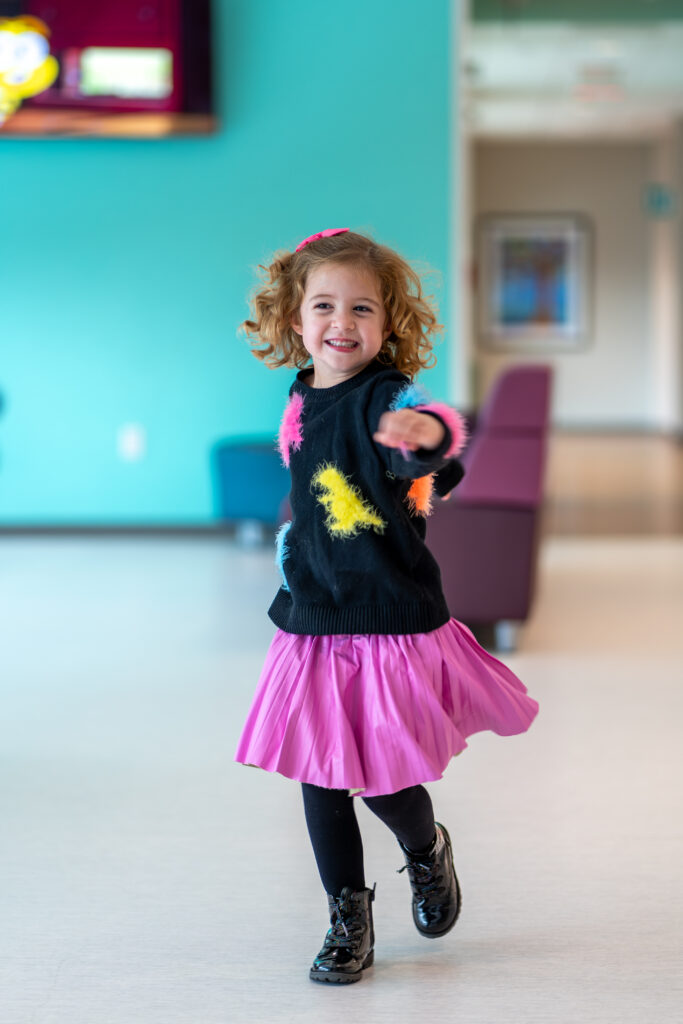It Takes a Village: How Dell Children’s Gave Charli Hilz Her Life Back

On a Friday afternoon in August, little Charlotte “Charli” Hilz sweetly peeks over her shoulder while sitting perched on her grandmother’s lap. Next week, her family will be vacationing in Destin, Florida—a place she’s visited before but was too sick to remember. “Not this time,” her grandmother promises, smiling at Charli. This time will be different. This will be a new adventure.
Charli will be five years old in November, but the past three years have felt much longer for the Hilz family. Yet, looking at her quietly sitting with her grandmother, her mother Mackenzie beside her, you would never guess that this little girl and her Dallas-based family have endured a journey marked by extraordinary ups and downs and remarkable triumphs in the face of their challenges.
A Condition Emerges During Unprecedented Times
It’s often said that children develop at their own pace, and during Charli’s earliest years, her progress seemed relatively normal. While she was slower to achieve some developmental milestones, nothing appeared overly concerning. Compounding matters, Charli was born in the fall of 2019, just months before the COVID-19 pandemic shut down the world. As many parents experienced, the pandemic created a developmental vacuum. Without peers to compare Charli’s progress with, the family navigated her early years largely in isolation.
It wasn’t until Charli’s grandmother noticed peculiar movements—her hands occasionally lifting on their own as if signaling a touchdown—that concerns arose. Although a brief assessment by the school district didn’t reveal anything alarming, the unsettling movements persisted, signaling the beginning of a life-altering chapter for Charli and her family.
A Hunch Leads to a Major Diagnosis
 The Hilz family’s world took a dramatic turn when Charli began experiencing seizures at just two years old. “They pretty quickly diagnosed her with epilepsy and put her on the first of many drugs,” Charli’s mother, Mackenzie, recalls. However, it soon became clear that no medication was working. Charli was experiencing up to 20 seizures a day, many appearing as brief absences or moments where she seemed to “space out.” She even had a 25- minute seizure that only went away after a visit to the ER with medication administered through an IV, and doctors still initially downplayed the severity of her condition. “They thought we didn’t know what a seizure looked like,” Mackenzie explains, voicing the early frustrations the family faced.
The Hilz family’s world took a dramatic turn when Charli began experiencing seizures at just two years old. “They pretty quickly diagnosed her with epilepsy and put her on the first of many drugs,” Charli’s mother, Mackenzie, recalls. However, it soon became clear that no medication was working. Charli was experiencing up to 20 seizures a day, many appearing as brief absences or moments where she seemed to “space out.” She even had a 25- minute seizure that only went away after a visit to the ER with medication administered through an IV, and doctors still initially downplayed the severity of her condition. “They thought we didn’t know what a seizure looked like,” Mackenzie explains, voicing the early frustrations the family faced.
Things changed when Mackenzie’s aunt, a doctor at Dell Children’s Medical Center (DCMC), connected them with Dr. Dave Clarke, Chief of the Dell Children’s Comprehensive Pediatric Epilepsy Center at DCMC. After an overnight EEG confirmed that Charli was indeed experiencing numerous daily seizures, in addition to almost constant electrical discharges while sleeping, the family felt like they were finally being heard. “Our world started changing for the better after that,” Mackenzie reflects. “During that appointment, we felt heard for the first time.”
The Struggle Continues
Charli’s epilepsy proved to be more complex than initially thought. The seizures began causing damage to her brain, leading to stroke-like symptoms that affected the entire left side of her body. “Her left side was weakened, and she couldn’t even take five steps without falling on her face,” Mackenzie recalls. Charli had to undergo extensive physical, occupational, and speech therapy just to regain basic functions. “She didn’t even have the reaction to put out her hands in front of her to catch herself,” her mother says, remembering the toll the condition took on her young daughter.
As the seizures persisted, the family endured many sleepless nights and emergency hospital visits. “There were so many times where we would go through several emergency drugs in one day,” Mackenzie shares, highlighting the intense emotional and physical strain that epilepsy placed on their lives.
A Game-Changing Surgery
The real breakthrough came when Dr. Clarke pinpointed the cause of Charli’s seizures—a small coil in her brain that had formed incorrectly in utero. This discovery led to two procedures: A Magnetoencephalography (MEG) test located the problem and a stereo EEG triangulated the area they could safely ablate without damaging sensory strip function in Charli’s brain.
“Dr. Clarke gave us our lives back,” Mackenzie says, her voice filled with gratitude. “I’ll never forget, before her surgery, she couldn’t color inside the lines. Two days after we got home, she was coloring perfectly—it was like this barrier in her brain was gone.”
A New Beginning
Since her surgeries, Charli’s progress has been nothing short of miraculous. Where she was once unable to walk steadily, Charli is now running, jumping, climbing, and even learning to ride a bike. Her seizures are under control, and she is on a fraction of the medication she once needed. “She’s the most driven kid,” Mackenzie proudly shares. “Every day, she’s doing things we never thought possible.”
Charli’s recovery has been both physical and emotional. Her innate empathy, which seemed to grow stronger through her ordeal, shines brightly. “She’s the most empathetic child ever,” Mackenzie says with admiration. “She always wants to help.”
The Impact of Dell Children’s Medical Center
 Much of Charli’s remarkable recovery is credited to the care she received at Dell Children’s Medical Center. The family felt supported at every step, from Dr. Clarke’s expert guidance to the compassionate nurses and staff. “From Dr. Clarke to the guard at the front of the hospital, we felt like our hands were being held the whole time,” Mackenzie says.
Much of Charli’s remarkable recovery is credited to the care she received at Dell Children’s Medical Center. The family felt supported at every step, from Dr. Clarke’s expert guidance to the compassionate nurses and staff. “From Dr. Clarke to the guard at the front of the hospital, we felt like our hands were being held the whole time,” Mackenzie says.
Charli’s father, Trevor, adds, “Everyone at Dell has been absolutely incredible. I’d make the drive from Dallas any day of the week, however many times it took, because of the people there and what it meant for Charli.”
One moment that particularly touched the family was when a surgery tech named David, who had undergone a similar surgery as a child, personally escorted Charli to the operating room. “He does this to comfort families because he’s been through it, and that gave me so much strength,” Mackenzie recalls, calling it a moment where she felt “hugged by an angel.”
And as for Dr. Clarke, the Hilz family would follow him to the ends of the earth to have him care for Charli. “If Dr. Clarke decided to move to China, we would move to China. He gave us our life back,” says Mackenzie.
Looking Forward
Today, Charli continues to amaze her family and doctors alike. She is catching up developmentally with her peers, and her most recent EEG results were nearly perfect—something the family once thought impossible.
“Charli is still on a small amount of medication but thriving. We look forward to a bright future for her, which is truly a miracle!” Mackenzie shares with hope.
Charli’s resilience and bright spirit have left a lasting impact on everyone she encounters. Whether it’s handing out balloons to other children in the hospital or making the nurses laugh as she dances with her “Elsa hat” (a playful reference to her EEG headgear), Charli embodies strength, kindness, and positivity.
“We’ve come a long way, and Dell Children’s gave us that chance,” Mackenzie says, her voice full of emotion. “They didn’t just give us our lives back; they made our lives better than we could even imagine.”
